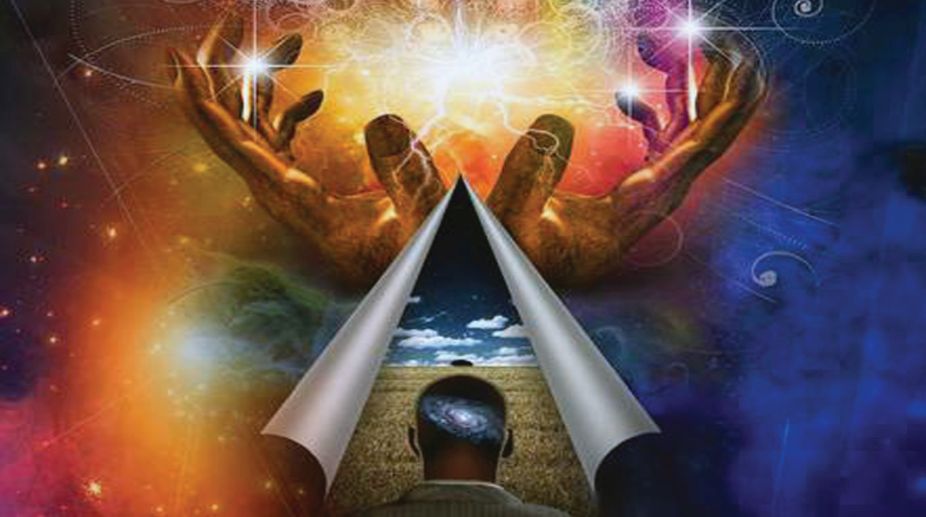Spirituality is entirely a matter of subjective observations corroborated by intuitive dialectics. It is founded on a firm scientific ground exclusive to itself. Having its reach above brain and mind, spirituality isn’t a matter for neuroscience or psychology. Its chief concern is cosmic consciousness. Both brain and mind in super conscious state of man are inactive.
Accordingly, his body and outer consciousness are also inert in it. The phenomenon is inscrutable to the various branches of physical science as well. Yet, out of their abhorrence to it, some sow their wild oats with the hope of falsifying spirituality. They ignorantly call its manifestations as neutral or mental malfunctions. They aren’t aware that speculations without practice are of no value of spirituality.
Advertisement
Spirituality has its own specific premise, procedure and purpose. It is well known that matter doesn’t reveal spirit. Spirit reveals itself. A person bereft of worldliness alone can realise it. If only he or she would sincerely try. In any case, it is inaccessible to untidy intellect.
Spiritual experiences are available to us through the vicissitudes of our daily life. When we sufficiently prepare ourselves by rigorous spiritual practices they dawn upon us as blessings. We could have them comfortably by virtue of our earnestness. “Competence” is an indispensable condition for achieving them. It makes one worthy of spiritual knowledge too. And how difficult it is for one to establish oneself as thus competent!
In the recent time Sri Ramakrishna of Dakshineswar explicitly demonstrates what it really means to be spiritual. He distinctly shows how it all happens. Incessantly spiritually charged, he even gives spirituality unto another who is truly competent. He does it intentionally with Swami Vivekananda during one of Vivekananda’s first visits to him.
Ramakrishna touches him in an ecstatic mood and immediately Vivekananda’s perception undergoes a metamorphosis – from a sceptic he changes into a mystic. He experiences something which he never did before. Recalling this he says: “The touch at once gave rise to a novel experience within me. With my eyes open I saw that the walls, and everything in that room, whirled rapidly and vanished into a naught, and the whole universe together with my individuality was about to merge in an all-encompassing mysterious void!”
Surprisingly, Ramakrishna, stroking his chest, also brings him back to himself in a trice. This obviously leaves Vivekananda wondering, making an indelible mark on his mind. He rules out it being anything like “mesmerism or hypnotism”. He says: “Amazed, I wondered what it could possibly be. It came and went by the mere wish of this amazing man!” But he doesn’t take long to discover that it was an experience of the cosmic consciousness which he had by the grace of his spiritually realised Master.
Notably, Ramakrishna doesn’t do the same with others. In itself, it is a vindication of the truth that he sees no other than Vivekananda s competent for such an extraordinary vision. Ramakrishna, however, now stops short of making the vision complete, keeping it pending for another opportune moment. Because he teaches and trains him in spiritual science, he moves in careful steps – as an accomplished preceptor’s wont is.
Vivekananda’s doubts spring from routine reasoning and rationality. He is still shorn of the idea that unless one is spiritually graduated, one isn’t perfectly rational and discerning. But then he is a perfect seeker, deserving the knowledge of the Absolute Truth. Ramakrishna is to remove his obstructions and inhibitions, and thereby let him have it.
A few days later, Ramakrishna comes out in his true spiritual colour again, when his disciple ridicules his teaching that everything is God (Consciousness Absolute). In an inebriated condition he gives him another purposeful touch, endowing him with that terminal experience of super consciousness that keeps him “in a sort of trance” for long.
Vivekananda talks about it afterward: “The magic touch of the Master that day immediately brought a wonderful change over my mind. I was astounded to find that really there was nothing in the universe but God!… I sat down to take my meal, but found that everything – the food, the plate, the person who served, and even myself – was nothing but That… This state of things continued for some days. When I became normal again, I realised that I must have had a glimpse of the Advaita ( non-dualistic) state.” By his admission, thenceforth he was never in denial of the oneness of existence.
Vivekananda himself launched as a teacher in due course makes a real dent. Maintaining his own originality, he places spirituality on a recognisable pedestal of science. He impresses scientists, psychologists, philosophers and thinkers such as Nicholas Tesla, William James, Paul Deussen and Max Muller. He says that “the soul is not essentially a knowing being.” Speaking about spiritual knowledge he gives his remark: “Even, knowledge being a compound, cannot be Absolute itself, but it is the nearest approach to it, and higher than Vasana (will), conscious or unconscious.
The Absolute first becomes the mixture of knowledge, then, in the second degree, that of will.” In his view, since consciousness or knowledge is a first degree compound, it precedes will. “Knowledge is action. First action, then reaction. When the mind perceives, then, as the reaction, it wills. The will is in the mind.” He says every evolution is preceded by an involution. This being so, the evolution of the will must be preceded by the involution of the cosmic consciousness – he feels.
He establishes spiritual science in this manner in the light of his own experiences which he earns because of the tutelage of his Master, who leads him in its discipline skillfully. This teacher-student relationship is sublime and inconceivable, where both are adequately competent from their respective individual positions.
Vivekananda owns a pure heart and a crystal clear mind ideal for transcendental truth to flash from within. Meditation is his forte; and concentration – which he considers “key to the store house of knowledge” – is perfectly under his grip. Once meditating in a deep forest at Almora in the Himalayas, he finds out the answer to an important question disturbing him.
Coming out of it, he tells his companion: “I have just now passed through one of the greatest moments of my life. Under this pepul tree one of the greatest problems of my life has been solved. I have found the oneness of the macrocosm with the microcosm. In this microcosm of the body everything that is there (in the macrocosm), exists. I have seen the whole universe within an atom.”
Reflections of this realisation are visible in his public lectures and talks. For example, he says in one of them: “The microcosm and the macrocosm are built on the same plan. Just as the individual soul is encased in the living body, so is the Universal Soul in the Living Prakriti (Nature) – the objective universe.” He gives his final comment on the subject as: “This dual aspect of the Universal soul is eternal. So what we perceive or feel is this combination of the Eternally Formed and the Eternally Formless.”
Numerous are the occasions in which he in this way offers the immutable laws of spiritual science that he actually sees intuitively in meditation. He, however, places every point on justification in the language of modern science. He says, “In every exact science there is a basis which is common to all humanity, so that we can at once see the truth and the fallacy of the conclusion drawn there from.”
Even then, there is a fundamental difference between the material science and the spiritual science. The former is temporal and dependent on sense perceptions. The latter is transcendental and independent of the activities (seeing, hearing, smelling, touching and tasting) of sense organs. Observations of sense organs, to spiritual science, are limited and deceptive, therefore unreliable. It demands a supple instrument of unprecedented power and penetration.
Discovery of the ultimate Truth – knowing which everything is known – cannot be done by anything gross. Mind, if it is clean and trained, makes a fit instrument for it. Mind is exceptional, for it can expand as well as contract. When internalised and concentrated, it undergoes extraordinary whetting.
A highly concentrated mind is inestimably energized and resilient. In its most elevated state it unravels the secrets of the creation. The common conclusion of all the seers and realised souls is that a close and complex mind isn’t capable of studying spiritual science. They show that practice of renunciation and austerity is a sine qua non for spiritual knowledge.
The writer is attached to the Ramakrishna Mission.











